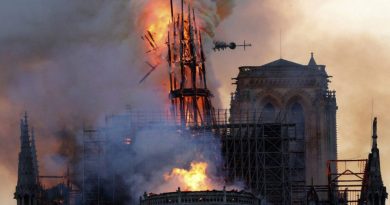Thomas Cullen: Moscow, Russia
I spent the Fall 2014 semester in Moscow, Russia, at the Moscow State Institute of International Relations, or MGIMO University. The business and international relations program was run by CIEE and it was their first year operating in Moscow. MGIMO is in the Top 5 Russian universities.
In many ways, it was a very interesting time to study in MGIMO as well as to be inside Russia because of the current political and economic events. My courses were all in English, but they were taught by Russian professors, and included US-Russian Relations, Russian Foreign Policy, Contemporary Politics in Russia, and a credited internship with Russia in the WTO.
The atmosphere that I encountered in Moscow was an acceptance of foreigners such as myself and the other Americans I was with. I did not feel that I was targeted at all for not looking or sounding like a native Russian, although I tried my hardest to fit in. I felt that since Moscow is such an international city, there was really no reason to expect people to be xenophobic. Despite this, I felt that there was widespread distain for NATO, and especially the United States, in terms of foreign policy differences.
This opinion was strongest in my US-Russian relations class where the opinion of the professor was that the West was acting hypocritically when the issue of Crimea and Ukraine came up. My Russian professors stuck to the narrative that Russia and NATO are not officially involved in supplying either side in the conflict in Eastern Ukraine. Despite this, they spoke as if both sides were involved. They felt that NATO has no reason to exist anymore because the major power that it was designed to counter, the Warsaw Pact, is defunct, and that NATO is in no position to talk about the illegality of Russia’s supposed backing of the pro-Russian rebels in Eastern Ukraine because of NATO’s instigation of conflicts in Iraq and Afghanistan, and the bombing of both Libya and Yugoslavia.
Regarding Vladimir Putin, public opinion of his actions as President are much more positive compared to public opinion of Barak Obama in the United States. The main reason for this is that people think Putin is on a mission to stand up to NATO expansion and develop positive relations with China. It’s not an issue of the fairness or the morality of Putin, but an issue of David standing up to the Goliath of NATO.
The one foil to Putin’s administration was the massive collapse of oil prices, leading to the crash of the ruble. The exchange rate was $1 to 48 rubles when I arrived in Moscow at the end of August, and it plummeted to 71 rubles per dollar when I left in December. This was a big deal because people realized how vulnerable the Russian economy still is, but at the same time, people were not terribly concerned because they have been through worse during the post-collapse inflation in the 90s. The reluctance of the West to help a struggling Russian Federation in its early days is still an area of bitterness among the professors, who feel that Russia was intentionally left to fend for itself because a strong Russia is always a threat to the power of the United States.
Politics aside, the places that I traveled to in Russia were absolutely beautiful. I visited Saint Petersburg earlier in the fall. There, I realized that the Hermitage Palace and Peterhof residence may just be the most beautiful places I have ever seen. I visited the historic Vladimir on the outskirts of Moscow. This was the capital of one of the principalities that ruled part of medieval Russia.
Speaking of medieval Russia, I also visited a city approximately 15 hours southeast of Moscow called Kazan. It was a region of Russia that has a mixed history under the Muslim Mongol Tatars as well as the Eastern Orthodox Russians.
Finally, I visited Volgograd in the south of Russia. This city used to be called Stalingrad, and it witnessed the first Soviet victory on the eastern front of World War II. It was amazing to have the honor of visiting the place and paying my respects to the fallen warriors who defended the city, which was so strategically important to the survival of the Soviet Union.

